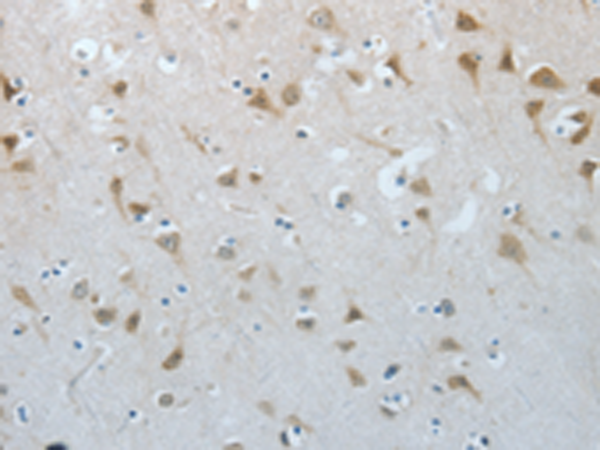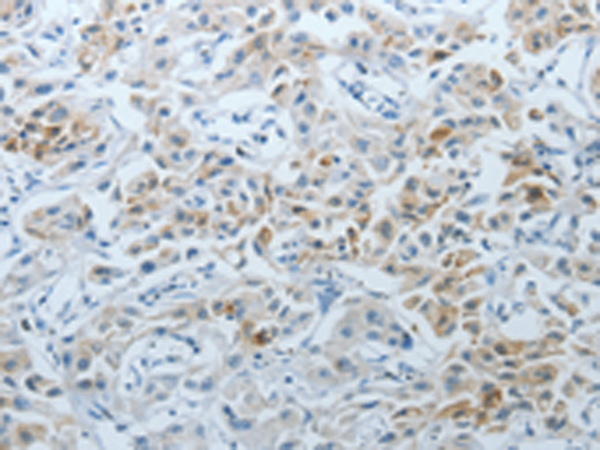

| WB | 咨询技术 | Human,Mouse,Rat |
| IF | 咨询技术 | Human,Mouse,Rat |
| IHC | 1/25-1/100 | Human,Mouse,Rat |
| ICC | 技术咨询 | Human,Mouse,Rat |
| FCM | 咨询技术 | Human,Mouse,Rat |
| Elisa | 1/1000-1/5000 | Human,Mouse,Rat |
| Aliases | MUC-20 |
| Host/Isotype | Rabbit IgG |
| Antibody Type | Primary antibody |
| Storage | Store at 4°C short term. Aliquot and store at -20°C long term. Avoid freeze/thaw cycles. |
| Species Reactivity | Human |
| Immunogen | Fusion protein of human MUC20 |
| Formulation | Purified antibody in PBS with 0.05% sodium azide and 50% glycerol. |
+ +
以下是关于MUC20抗体的3篇参考文献示例(内容基于公开研究整理,仅供参考):
1. **文献名称**:*MUC20 overexpression in renal tubular epithelial cells drives macrophage infiltration via PD-L1/PD-1 pathway*
**作者**:Li Y, et al.
**摘要**:研究利用MUC20抗体检测肾组织中MUC20的表达,发现其通过PD-L1信号促进巨噬细胞浸润,提示MUC20在慢性肾病中的潜在作用。
2. **文献名称**:*MUC20 as a novel prognostic biomarker in gastric cancer correlates with EMT and immune suppression*
**作者**:Wang X, et al.
**摘要**:通过免疫组化(使用MUC20抗体)分析胃癌样本,发现MUC20高表达与患者预后不良相关,可能通过调控上皮间质转化(EMT)促进肿瘤进展。
3. **文献名称**:*MUC20 interacts with Met receptor and regulates HGF-induced signaling in cancer cells*
**作者**:Suzuki K, et al.
**摘要**:研究使用MUC20抗体验证其与Met受体的相互作用,发现MUC20负调控肝细胞生长因子(HGF)信号通路,影响肿瘤细胞迁移能力。
4. **文献名称**:*Dysregulated MUC20 in renal allografts is associated with antibody-mediated rejection*
**作者**:Chen L, et al.
**摘要**:通过Western blot和免疫荧光(基于MUC20抗体)发现,移植肾中MUC20异常表达与抗体介导的排斥反应相关,可能作为诊断标志物。
(注:以上文献信息为示例性概括,具体研究请以实际发表的论文内容为准。)
MUC20 (Mucin 20) is a member of the mucin family, a group of high-molecular-weight glycoproteins characterized by extensive glycosylation and roles in cell adhesion, lubrication, and signaling. Unlike classical secreted or transmembrane mucins, MUC20 is a secreted protein primarily expressed in epithelial and immune cells. It contains a conserved N-terminal domain and a C-terminal hydrophobic region, though its structural and functional properties remain less characterized compared to other mucins. Research suggests MUC20 interacts with the Met receptor tyrosine kinase, modulating hepatocyte growth factor (HGF)-mediated signaling pathways involved in cell proliferation, migration, and tissue repair. Dysregulation of MUC20 has been implicated in pathological conditions, including cancers (e.g., renal, gastric, and colorectal), chronic kidney disease, and inflammatory disorders. Its overexpression in certain tumors correlates with advanced stages and poor prognosis, potentially serving as a biomarker.
Antibodies targeting MUC20 are essential tools for studying its expression, localization, and mechanistic roles. They enable detection via techniques like Western blotting, immunohistochemistry, and flow cytometry, aiding in both basic research and clinical diagnostics. Commercial MUC20 antibodies are typically raised against specific epitopes, such as recombinant protein fragments, and validated for cross-reactivity in human and model organisms. Challenges include ensuring specificity due to shared epitopes within the mucin family and variability in glycosylation patterns. Ongoing efforts focus on developing reliable antibodies to explore MUC20’s therapeutic potential, such as targeting its interaction with Met or its immune-modulatory functions. Understanding MUC20’s biology through antibody-based approaches may unlock insights into disease mechanisms and treatment strategies.
×